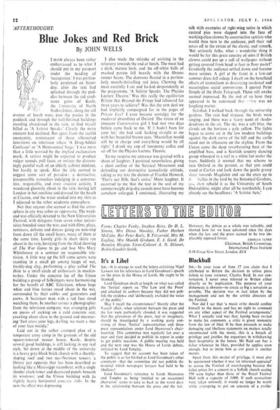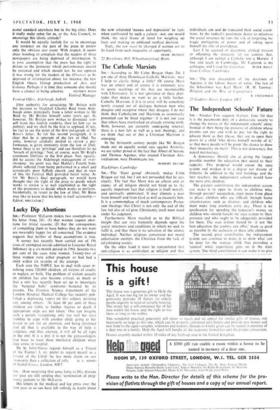Blackball
SIR,—In your issue of June 17 you claim that I attributed to Britten the decision to refuse press tickets to your reviewer, Charles Reid. In our con- versation, I never once referred to Britten either directly or by implication. The purpose of your dishonesty is obvious—to create as big a sensation as possible. The decision was in fact taken by the management and not by the artistic directors of the Festival.
Nor did I say that 'a music critic should confine himself to the music and has no right to comment on any other aspect of the Festival arrangements.' What I actually said was that, having been invited to make his comments, a critic is given immunity from the law of libel. If he then proceeds to make damaging and libellous statements on matters totally unconnected with the music, this is a breach of privilege and justifies the organisers in withdrawing their hospitality in the future. Mr Reid can buy a ticket whenever he likes, provided he applies soon enough, but to invite him as our guest is another matter.
Apart from this matter of privilege, it must also be questioned whether it was 'an informed appraisal' to accuse the Festival of overcharging because the ticket prices for a concert in a Suffolk church seating 550 were higher than those of the Royal Festival Hall with a capacity of 3,000. If such accusations were taken seriously. it would no longer be worth while attempting to put on concerts of a profes-
'tonal standard anywhere but in the big cities. Does it really make sense for us, or the Arts Council, to encourage this idiotic attitude?
It would be equally foolish for us to encourage any tendency on the part of the press to review only the obvious star event. With respect, it seems sheer humbug to complain that the readers of three newspapers are being deprived of information. It is your assumption that the press has the right to dictate to the promoter which performances should be reviewed and which should not. In our opinion it was wrong for the readers of the Observe, to be deprived of information about, for instance. the new English Opera Group production of Ads and Galatea. Perhaps it is time that someone else should
have a chance of being selective. STEPHEN REISS Festival Manager
Festival Office, Aldeburgh, Suffolk
[Our authority for associating Mr Britten with the decision to blackball Charles Reid from Alde- burgh stems principally from a letter written to Mr Reid by Mr Britten himself some years ago. If, however, Mr Britten now wishes to dissociate him- self from this foolish vendetta, then let him say so publicly and we shall be the first to applaud. If not, we fail to see the point of the first paragraph of Mr Reiss's letter. As for his second paragraph, it is clear that he is ignorant of the law of libel. No critic. however cordially invited to review a per- formance, is given immunity from the law of libel; hence there is no 'privilege' and can therefore be no 'breach of privilege.' Nor, of course, were Mr Reid's comments libellous in the first place. Nor, equally, did he accuse the Aldeburgh management of over- charging: his point was that Mahler's Fourth Sym- phony suffered from being performed in a small and acoustically poor Suffolk church, and that in view of this the Festival Hall provided better value. As fo'r Mr Reiss's final paragraph, we would have thought that the right of the press to decide which • works to review is as well established as the right of the promoters to decide which works to perform. Incidentally, to revert to the law of libel, Mr Reiss may like to know that his letter is itself actionable.— Editor, SPECTATOR.]































 Previous page
Previous page